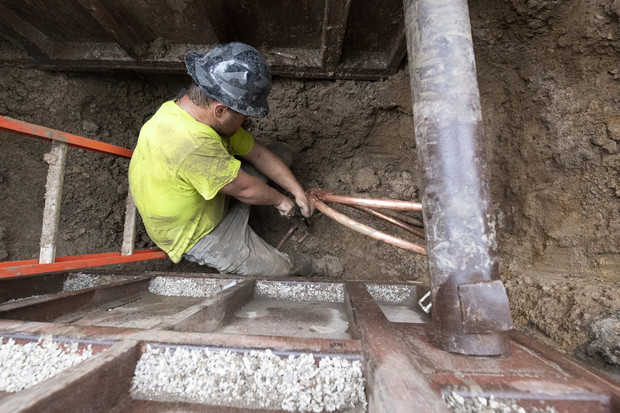Wisconsin Awarded $142 Million to Address PFAS, Lead Pipes
Federal funding comes from bipartisan infrastructure bill.

A worker who identified himself only as Nate flares copper tubing as a crew swaps out a lea.d water service line for copper pipes in Milwaukee on June 29, 2021. Since 2017, Milwaukee Water Works says it has replaced 3,881 pipelines made of potentially hazardous lead. Eliminating the city’s remaining 70,000 lead pipes at that pace would take more than 70 years and cost hundreds of millions of dollars. Isaac Wasserman/Wisconsin Watch
Federal environmental regulators have announced Wisconsin will receive $142.7 million to target removal of lead pipes, harmful forever chemicals and water challenges in underserved communities as part of the first allocation under the bipartisan infrastructure law.
U.S. Environmental Protection Agency Administrator Michael Regan announced the funding Thursday as part of $7.4 billion awarded to states and tribes under the $1 trillion bipartisan infrastructure bill signed into law by President Joe Biden on Nov. 15.
Around half of the funding will be made available as grants or loans to provide to rural and urban communities.
“Billions of dollars are about to start flowing to states and it is critical that EPA partners with states, Tribes, and territories to ensure the benefits of these investments are delivered in the most equitable way,” said Regan in a news release.
In a letter to Gov. Tony Evers, Regan urged prioritizing grants for disadvantaged communities.
“To further aid states, tribes, local governments and water systems, the EPA will also provide technical assistance to help disadvantaged communities overcome barriers in applying for and receiving loans and grants through the (state revolving loan funds),” wrote Regan.
State revolving loan fund programs offer low-cost financing to help communities repair or upgrade water and wastewater infrastructure.
Assistant Administrator of the EPA’s Office of Water Radhika Fox will soon issue guidance to state agencies on how they should use the funding provided under the law. In his letter, Regan urged states to correct disparities with funding, make progress on replacing lead service lines and provide relief to communities struggling with contamination from harmful perfluoroalkyl and polyfluoroalkyl substances (PFAS).
As for PFAS, state environmental regulators have detected 51 sites within 25 communities that have PFAS polluted groundwater. However, less than 1 percent of the state’s more than 11,000 public water supplies have been tested for the chemicals. PFAS has been found in public and private wells in communities across the state, including Peshtigo, Campbell, Marinette, La Crosse, Eau Claire, Rhinelander and Madison.
The funding under the infrastructure bill represents the single largest investment in water infrastructure in decades, but the needs are great. The American Society of Civil Engineers estimates Wisconsin water and wastewater systems need around $15 billion over the next two decades to address aging infrastructure.
Wisconsin receives $142M to combat water challenges under bipartisan infrastructure law was originally published by Wisconsin Public Radio.
More about the Lead Crisis
- MPS Plans Lead Remediation at 40 Schools This Summer - Evan Casey - Jun 27th, 2025
- Baldwin, Reed Demand Written Answers from RFK, Jr. on Firings of Childhood Lead Poisoning Experts at CDC - U.S. Sen. Tammy Baldwin - Jun 11th, 2025
- MPS’s LaFollette School Cleared of Lead Risks After Stabilization Work - Milwaukee Public Schools - Jun 11th, 2025
- Sen. Baldwin Hears From Parents About MPS Lead Crisis, Chides RFK Jr. - Evan Casey - Jun 9th, 2025
- Reps. Margaret Arney and Darrin Madison Urge Joint Finance Committee to Reinstate Essential Lead Abatement Funding - State Rep. Margaret Arney - Jun 5th, 2025
- Gov. Evers, DHS Continue Administration’s Efforts to Combat Lead Poisoning Statewide with Permanent Rule - Gov. Tony Evers - May 27th, 2025
- RFK Jr. Claims ‘Team’ Is In Milwaukee Helping With Lead Crisis, Health Department Can’t Find Them - Nick Rommel - May 22nd, 2025
- MPS Announces Starms Early Childhood Center Is Cleared of Lead Dangers - Milwaukee Public Schools - May 21st, 2025
- Milwaukee Has Removed 10,000 Lead Laterals - Graham Kilmer - May 13th, 2025
- New MPS Superintendent Cutting Central Office Jobs - Corrinne Hess - May 8th, 2025
Read more about Lead Crisis here
More about the PFAS Problem
- Wisconsin Supreme Court Backs State Regulators of PFAS Pollution - Danielle Kaeding and Rich Kremer - Jun 24th, 2025
- Gov. Evers Releases Statement on Wisconsin Supreme Court Decision in WMC Inc v. DNR - Gov. Tony Evers - Jun 24th, 2025
- Rep. Shelia Stubbs Elected Great Lakes-St. Lawrence Legislative Caucus Vice Chair of the Task Force on Emerging Contaminants - State Rep. Shelia Stubbs - Jun 16th, 2025
- Legislature’s Budget Committee Unanimously Boosts Clean Water Funding By $732 Million - Danielle Kaeding - Jun 6th, 2025
- Trump Administration moves to weaken standards for toxic ‘forever chemicals’ in drinking water - Clean Wisconsin - May 14th, 2025
- Wisconsin Officials Unhappy With EPA Plan To Weaken PFAS Standards - Danielle Kaeding - May 14th, 2025
- Wisconsin Could Lose $55 Million Under Proposed EPA Budget Cuts - Danielle Kaeding - May 7th, 2025
- French Island Makes Progress on PFAS Pollution - Richelle Wilson and Trevor Hook - Mar 24th, 2025
- Who Will Pay for PFAS Pollution? - Bennet Goldstein - Feb 27th, 2025
- Gov. Evers’ biennial state budget prioritizes clean water, clean energy, and public lands for Wisconsin - Wisconsin Conservation Voters - Feb 18th, 2025
Read more about PFAS Problem here





















